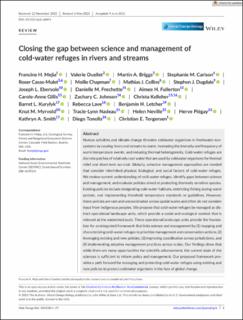Please use this identifier to cite or link to this item:
https://doi.org/10.21256/zhaw-28429| Publication type: | Article in scientific journal |
| Type of review: | Peer review (publication) |
| Title: | Closing the gap between science and management of cold-water refuges in rivers and streams |
| Authors: | Mejia, Francine H. Ouellet, Valerie Briggs, Martin A. Carlson, Stephanie M. Casas-Mulet, Roser Chapman, Mollie Collins, Mathias J. Dugdale, Stephen J. Ebersole, Joseph L. Frechette, Danielle M. Fullerton, Aimee H. Gillis, Carole-Anne Johnson, Zachary C. Kelleher, Christa Kurylyk, Barret L. Lave, Rebecca Letcher, Benjamin H. Myrvold, Knut M. Nadeau, Tracie-Lynn Neville, Helen Piégay, Herve Smith, Kathryn A. Tonolla, Diego Torgersen, Christian E. |
| et. al: | No |
| DOI: | 10.1111/gcb.16844 10.21256/zhaw-28429 |
| Published in: | Global Change Biology |
| Issue Date: | 19-Jul-2023 |
| Publisher / Ed. Institution: | Wiley |
| ISSN: | 1354-1013 1365-2486 |
| Language: | English |
| Subjects: | Behavioral thermoregulation; Climate change adaptation; Lotic ecosystem management; Refugium; Salmonids; Temperature; Thermal heterogeneity; Thermal refuge |
| Subject (DDC): | 333.7: Land, natural recreational areas 551: Geology and hydrology |
| Abstract: | Human activities and climate change threaten coldwater organisms in freshwater ecosystems by causing rivers and streams to warm, increasing the intensity and frequency of warm temperature events, and reducing thermal heterogeneity. Cold-water refuges are discrete patches of relatively cool water that are used by coldwater organisms for thermal relief and short-term survival. Globally, cohesive management approaches are needed that consider interlinked physical, biological, and social factors of cold-water refuges. We review current understanding of cold-water refuges, identify gaps between science and management, and evaluate policies aimed at protecting thermally sensitive species. Existing policies include designating cold-water habitats, restricting fishing during warm periods, and implementing threshold temperature standards or guidelines. However, these policies are rare and uncoordinated across spatial scales and often do not consider input from Indigenous peoples. We propose that cold-water refuges be managed as distinct operational landscape units, which provide a social and ecological context that is relevant at the watershed scale. These operational landscape units provide the foundation for an integrated framework that links science and management by (1) mapping and characterizing cold-water refuges to prioritize management and conservation actions, (2) leveraging existing and new policies, (3) improving coordination across jurisdictions, and (4) implementing adaptive management practices across scales. Our findings show that while there are many opportunities for scientific advancement, the current state of the sciences is sufficient to inform policy and management. Our proposed framework provides a path forward for managing and protecting cold-water refuges using existing and new policies to protect coldwater organisms in the face of global change. |
| URI: | https://digitalcollection.zhaw.ch/handle/11475/28429 |
| Fulltext version: | Published version |
| License (according to publishing contract): | CC BY-NC 4.0: Attribution - Non commercial 4.0 International |
| Departement: | Life Sciences and Facility Management |
| Organisational Unit: | Institute of Natural Resource Sciences (IUNR) |
| Appears in collections: | Publikationen Life Sciences und Facility Management |
Files in This Item:
| File | Description | Size | Format | |
|---|---|---|---|---|
| 2023_Mejia-etal_Science-and-management-of-cold‐water-refuges-in-rivers.pdf | 8.32 MB | Adobe PDF |  View/Open |
Show full item record
Mejia, F. H., Ouellet, V., Briggs, M. A., Carlson, S. M., Casas-Mulet, R., Chapman, M., Collins, M. J., Dugdale, S. J., Ebersole, J. L., Frechette, D. M., Fullerton, A. H., Gillis, C.-A., Johnson, Z. C., Kelleher, C., Kurylyk, B. L., Lave, R., Letcher, B. H., Myrvold, K. M., Nadeau, T.-L., et al. (2023). Closing the gap between science and management of cold-water refuges in rivers and streams. Global Change Biology. https://doi.org/10.1111/gcb.16844
Mejia, F.H. et al. (2023) ‘Closing the gap between science and management of cold-water refuges in rivers and streams’, Global Change Biology [Preprint]. Available at: https://doi.org/10.1111/gcb.16844.
F. H. Mejia et al., “Closing the gap between science and management of cold-water refuges in rivers and streams,” Global Change Biology, Jul. 2023, doi: 10.1111/gcb.16844.
MEJIA, Francine H., Valerie OUELLET, Martin A. BRIGGS, Stephanie M. CARLSON, Roser CASAS-MULET, Mollie CHAPMAN, Mathias J. COLLINS, Stephen J. DUGDALE, Joseph L. EBERSOLE, Danielle M. FRECHETTE, Aimee H. FULLERTON, Carole-Anne GILLIS, Zachary C. JOHNSON, Christa KELLEHER, Barret L. KURYLYK, Rebecca LAVE, Benjamin H. LETCHER, Knut M. MYRVOLD, Tracie-Lynn NADEAU, Helen NEVILLE, Herve PIÉGAY, Kathryn A. SMITH, Diego TONOLLA und Christian E. TORGERSEN, 2023. Closing the gap between science and management of cold-water refuges in rivers and streams. Global Change Biology. 19 Juli 2023. DOI 10.1111/gcb.16844
Mejia, Francine H., Valerie Ouellet, Martin A. Briggs, Stephanie M. Carlson, Roser Casas-Mulet, Mollie Chapman, Mathias J. Collins, et al. 2023. “Closing the Gap between Science and Management of Cold-Water Refuges in Rivers and Streams.” Global Change Biology, July. https://doi.org/10.1111/gcb.16844.
Mejia, Francine H., et al. “Closing the Gap between Science and Management of Cold-Water Refuges in Rivers and Streams.” Global Change Biology, July 2023, https://doi.org/10.1111/gcb.16844.
Items in DSpace are protected by copyright, with all rights reserved, unless otherwise indicated.